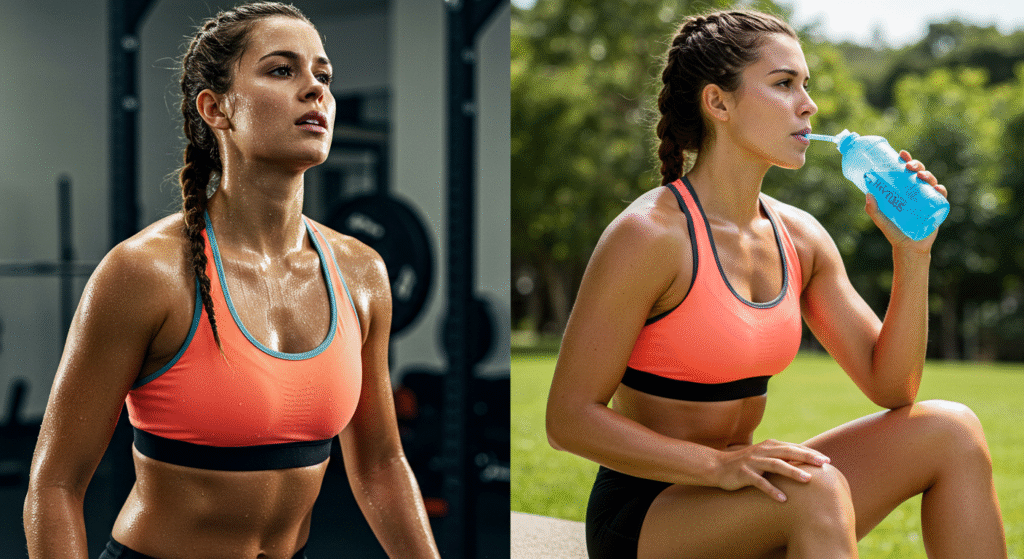Introduction: More Than Just a Sip
You’ve probably heard the phrase “Drink more water” thousands of times. It shows up in wellness blogs, doctor’s advice, and maybe even your own mental pep talks on sluggish afternoons. Yet despite being the simplest health hack available, hydration is also one of the most misunderstood. Many people assume thirst alone is a reliable guide. Spoiler alert: by the time you actually feel thirsty, you’re often already mildly dehydrated.
Here’s the kicker—hydration isn’t just about quenching cravings; it touches nearly every cell in your body. From brainpower to digestion to glowing skin, water is the secret sidekick supporting all essential systems. It’s far more than a plain drink—it’s a fuel, a detox partner, and even mood regulator.
In this post, we’ll explore why water matters more than you think, backed by science and practical tips. You’ll learn the surprising signs of dehydration, how much water you really need, clever ways to sneak hydration into busy days, and even the myths worth ignoring. If you’ve ever wondered why your energy lags, your skin feels dry, or your workouts hit a wall, the answer might be as simple as drinking smarter.
Why Is Hydration So Important for the Human Body?
Think of water as the unsung conductor of your internal orchestra. It doesn’t make noise, but it directs every section to play in harmony. Without enough, the music falls apart. Here are the biological realities:
- Temperature regulation: Water absorbs and redistributes heat, letting you sweat without overheating like a faulty laptop.
- Nutrient transportation: It’s the Uber driver of vitamins, minerals, and glucose.
- Detoxification: Water helps your kidneys flush waste—your body’s own recycling service depends on it.
- Lubrication: From joints to tissues, hydration ensures smooth movement.
- Cognitive clarity: Even mild dehydration (1–2% body weight loss) can impair focus and short-term memory.
In short: water isn’t a luxury—it’s the baseline.
What Happens to Your Body When You’re Dehydrated?
Dehydration doesn’t always scream its presence. It whispers first. Here’s what happens step by step:
- Mild Dehydration (1–2% fluid loss): Fatigue creeps in, headaches buzz, and concentration wavers.
- Moderate Levels (3–5% loss): Dizziness, rapid heartbeat, and dry mouth arrive. Exercise endurance plummets.
- Severe Dehydration: Can lead to dangerously low blood pressure, heat injury, or kidney complications.
Fun fact to appreciate: just a 2% drop in hydration can reduce physical performance significantly. Imagine starting a marathon already handicapped—that’s dehydration at work.
How Much Water Should You Drink per Day?
Spoiler: it’s not always “8 glasses.” While that advice is easy to remember, it doesn’t fit everyone. The actual requirement depends on age, body size, activity levels, environment, and health status.
General Guidelines:
- Men: ~3.7 liters (125 ounces) daily (total fluids from food + drink).
- Women: ~2.7 liters (91 ounces) daily.
Step-by-Step Way to Personalize:
- Calculate basic needs: About 30–35 ml per kilogram of body weight.
- Factor in exercise: Add ½–1 liter per hour of moderate-to-intense activity.
- Adjust for climate: Hotter or higher altitudes increase demand.
- Listen to your body: Check urine color—a pale straw shade usually signals you’re on track.
What Are Hidden Signs You’re Not Drinking Enough Water?
It’s not just cracks in your lips. The sneakiest dehydration symptoms fly under the radar:
- Brain fog and irritability (water influences neurotransmitters).
- Cravings for sugar (thirst can disguise itself as hunger).
- Dry skin despite moisturizer (hydration starts from the inside out).
- Constipation (water softens stool by blending into the digestive process).
- Frequent headaches (your brain is ~75% water and doesn’t appreciate droughts).
So next time you get cranky at 3 p.m., try sipping water before raiding the snack drawer.
Can You Drink Too Much Water?
Yes—though it’s rarer, and less talked about. Overhydration, or water intoxication, dilutes sodium levels in the blood. Symptoms include nausea, confusion, and in extreme cases, seizures. Athletes guzzling gallons quickly or people pushing “water challenges” are more at risk.
The rule of thumb: hydration should be balanced—more like a steady stream than a flood.
What’s the Best Way to Stay Hydrated During the Day?
Here’s a toolkit that blends science with practical hacks:
- Start early: Drink a glass soon after waking.
- Carry a reusable bottle: Acts as a visual reminder (and eco-friendly statement piece).
- Infuse flavor: Lemon, cucumber, or berries if plain water bores you.
- Use meals: Soups, salads, fruits (watermelon is 90% water).
- Set gentle cues: Reminder apps or pairing water breaks with routines (ex: every time you check email, sip).
- Hydration hierarchy: Prioritize water. Coffee, tea, and milk do count somewhat, but soda and alcohol? Negative points.
Does Coffee or Tea Dehydrate You?
Here’s the truth: coffee and tea aren’t villains. While caffeine is mildly diuretic, the hydration you gain from the liquid outweighs the loss. So yes, your morning latte does count toward fluid intake. Just don’t outsource all your hydration needs to espresso shots—your nerves won’t thank you.
What’s the Connection Between Hydration and Fitness?
Water absolutely makes or breaks your workouts. Here’s why:
- Pre-workout hydration primes your body to regulate temperature.
- During exercise, losing even 2% of body fluid decreases endurance and increases perceived effort.
- Post-workout, water supports recovery by reducing muscle soreness and replenishing lost fluids.
Pro tip: Weigh yourself before and after workouts. For every pound lost through sweat, drink about 16–24 ounces of water afterward.
Can Hydration Improve Skin Health?
Advertisers love to tell you that hydration equals glowing skin. And while no amount of water alone replaces sunscreen or balanced diet, studies support this:
- People with higher water intake often have greater skin elasticity.
- A hydrated system supports circulation, carrying nutrients to skin cells.
- Dehydration exaggerates fine lines and dryness.
Hydration isn’t a cosmetic miracle, but it is the cheapest skincare routine out there.
Common Myths About Hydration—Busted
- “If you’re thirsty, you’re fine.” Nope, thirst is a late warning sign.
- “Cold water burns calories.” While your body does warm it slightly, calorie burn is negligible—not an excuse for ice baths.
- “You need sports drinks daily.” Unless you’re an athlete doing prolonged intense exercise, plain water is enough.
- “Clear urine means perfect hydration.” It can also mean overhydration. Aim for pale yellow, not invisible.
FAQs: Quick Answers to Common Questions
1. Is sparkling water as hydrating as still water?
Yes, carbonated (unsweetened) water hydrates just as well, though some people experience bloating.
2. Can eating watery foods replace drinking?
Watery foods like cucumber or oranges help, but they usually cover only ~20% of total fluid needs.
3. Does alcohol dehydrate you?
Yes. Alcohol is a diuretic. That’s why hangovers are paired with dry mouth and headaches. Always chase drinks with water.
4. How do hydration needs change with age?
Older adults often have a weaker thirst response, so they may unknowingly drink less. Prioritizing mindful sips throughout the day becomes crucial.
5. Should kids drink the same amount as adults?
No—children’s intake depends on age and size. For example, kids 4–8 years typically need ~5 cups of fluids daily.
6. How to know if you’re hydrated without overthinking?
Check your urine color: pale yellow = hydrated, dark = drink more, crystal clear = possibly overdoing it.
Practical 7-Day Hydration Challenge
Want to make hydration a habit? Test this one-week plan:
> Day 1: Start with 1 full glass of water upon waking.
> Day 2: Add infused water in the afternoon (lemon + mint).
> Day 3: Pair each meal with a cup of water.
> Day 4: Carry a 20oz bottle, aim to refill 2–3 times.
> Day 5: Swap one soda/juice for water.
> Day 6: Drink water pre- and post-exercise.
> Day 7: Reflect, note changes in energy, mood, or digestion.
By day seven, hydration feels less like an effort and more like autopilot.
Conclusion: Raising a Glass to Your Health
Water is often overlooked because it seems too simple to matter. But hydration is an invisible hero—empowering your brain to think clearly, your body to move smoothly, and your mood to stay balanced. The science is unshakable: we thrive when adequately hydrated, and we quite literally dry out when we’re not.
The best part? This is one of the few health upgrades that costs almost nothing, requires no fancy subscription, and works for everyone from toddlers to grandparents. Start with small tweaks: carry a bottle, sneak in hydrating foods, and build cues into your daily rhythm.
So here’s your challenge: take the 7-day hydration plan and see how your body responds. You might just find that clearer skin, sharper focus, better workouts, and more energy were only a sip away.
Cheers—to your health, one glass at a time.

